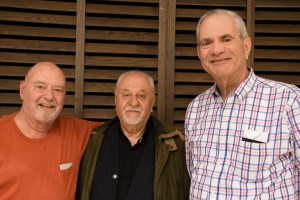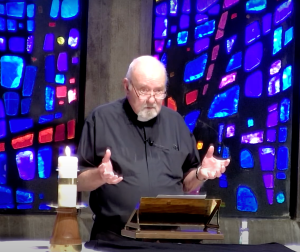If you had a disgustingly grimy rag and someone else had one that wasn’t quite as grimy — does that comparison really matter if both come out of the washing machine as white as snow? Interim Pastor David Mueller challenged us to reconsider our tendency toward “justification by comparison” in his sermon on Sunday, November 29.
Pastor Mueller is providing the text of his sermon again and plans to continue doing so for those who appreciate the written format during this coronavirus (COVID-19) pandemic..
The link to our service video on our YouTube channel is below, followed by the text of the sermon.
We thank all who contribute to our ability to worship together — whether online or in our sanctuary — and are especially grateful for the leadership of Pastor Mueller and John Lasher, our director of music and worship arts, who makes these videos possible.
“Are We Serious?” (Isaiah 64:1-9)
Interim Pastor David E. Mueller
I have opted during Advent to preach based on Isaiah. Isaiah was evidently the favorite prophet of Jesus, because He quoted Isaiah most frequently. Obviously, this is a look back, when Advent invites us to look forward. True prophesy, however, always looks back, at the present and then on to the future. In any event, “Rise and Shine,” for your redemption draws nigh! (PRAYER)
At the risk of repeating myself, a growing liability of people — including preachers my age — I find reading nearly all the Hebrew Scriptures a study of contrasts.
On the one hand we have the rather constant intransigence of the Hebrews, the stubbornness, the sins. On the other hand, we have the constant love and care of God toward his chosen people. They may not have been good at keeping their covenant promises, but God is perfect at keeping his.
God chastised them for sure. Jeremiah the Prophet reminds us, however, “’For I am with you,’ says the Lord, ‘to save you; I will make an end of all the nations among which I scattered you, but of you I will not make an end. I will chastise you in just measure and I will by no means leave you unpunished.’” (30: 11).
We read a similar statement in the Christian letter to the Hebrews (12:5b & 6): “My child, do not regard lightly the disciplines of the Lord or lose heart when you are punished by him; for the Lord disciplines those whom he loves, and chastises every child whom he accepts.”
When God is chastising, we do not need to feel ourselves unloved. One cannot help but wonder whether or not the whole world is being chastised right now. This, however, is a part of why I trust the Scriptures. No people writing about themselves have been as hard on themselves as were the Hebrews. In most instances, nations writing their history are much kinder and tend to overlook or cover up the nasty stuff. God, while loving, can be plenty hard on those he loves.
Often in the Hebrew Scriptures, especially the Psalms, God’s majesty and magnificence is lifted up in praise. Here in Isaiah 64, God’s might and power is accentuated. God “tears open the heavens,” and “mountains quake” and there is “fire,” and “awesome deeds.” All this is directed toward God’s adversaries.
It is here that many of my questions about God arise and cause me grief.
“Oh that you would tear open the heavens and come down.” So just where were you, Lord, when the Christian Church embarrassed and misrepresented you in five Crusades? What about the Spanish Inquisition? There your chastisement on the Church surely would have helped and saved lives! How about the Holocaust? Six million of your chosen were murdered in some form, along with four million others. Could you not have torn the heavens opened and come down to help? And right now, besides the virus, why do you allow such political nonsense to go on? By the way, I have some folk I would like you to smite wiping them off the face of the earth. If only I was God!
Not only is none of us a god, but on our behalf as well, Isaiah proclaims. “You meet those who gladly do what is right, those who remember you in your ways.” Is that us? Hardly! “But you were angry and we sinned … we have become like one who is unclean, and all our righteous deeds are like a filthy cloth.” Do you believe this castigation? Who us? We are the good people. We attend worship, support the church, feed the poor, pay taxes. Are we the ones to take the hits?
The Reformation mantra was “Justification by faith” and we Lutheran Christians and others still lift up the banner of those words and the theology behind them. But we are so quick — and I will not exclude myself — to practice “justification by comparison.” We are of this political persuasion and not like those jerks on the other side. We are better than them! We do not rob banks, cheat on our taxes, mistreat our spouses, abuse our children, neglect elderly adults, curse, swear, lie and use witchcraft. Lord, smite the others and spare us any further inconvenience or pain. Thank you very much.
Sorry, it does not work that way.
I gave a children’s sermon decades ago, held up an oily rag, and asked the kids how much they thought I paid for it. After a number of guesses, I told them “a million dollars.” One kids cried out: “Boy, did you get ripped off.” But if you had a disgustingly grimy rag, someone else had one with far fewer spots on it, you both put them in the wash and they came out white as snow, what good would any further comparison be? Hold on to that notion for a few moments.
“There is no one who calls upon your name or attempts to take hold of you.” No one! “For you have hidden your face from us and have delivered us into the hand of our iniquity.”
Is COVID-19 God’s chastisement on us and the whole world? Did God cause the deplorable condition and division in American politics? Has God removed himself and left us to contend with present reality on our own? Perhaps! In any event, now is for certain a time for genuine humility and the absolute death of any pride remaining in us!
With Isaiah, our prayer must be: “Do not be exceedingly angry, O Lord, and do not remember our iniquity forever. Now consider, we are all your people.” Note: “we are all your people.” Yep! God loves all those others, too. You know, the ones I and perhaps you would have God smite!
But Lord, where are you? Will you tear open the heavens and come down? God already has!
Instead of coming in power, God came in peace as the Prince of Peace. Rather than come as a punisher, he came as the Redeemer. Rather than come as a victor, he came as a victim to be with us in our suffering, our wondering, our confusion, even our all too often misplaced anger and especially in our deaths.
He came as “God with us (Immanuel),” for us and not against us. He came not to kill but to die! He is coming again! I hope we can rise, shine and anticipate with great and abundant joy! Are we serious yet?
Oh, by the way, in the meantime why not pray and work for allowing the oily rags of everyone we can find to be washed in the blood of the Savior and be made white as snow?
Amen.

















 e Wisdom Literature to seek some assistance. There are at least a few hints herein.
e Wisdom Literature to seek some assistance. There are at least a few hints herein.